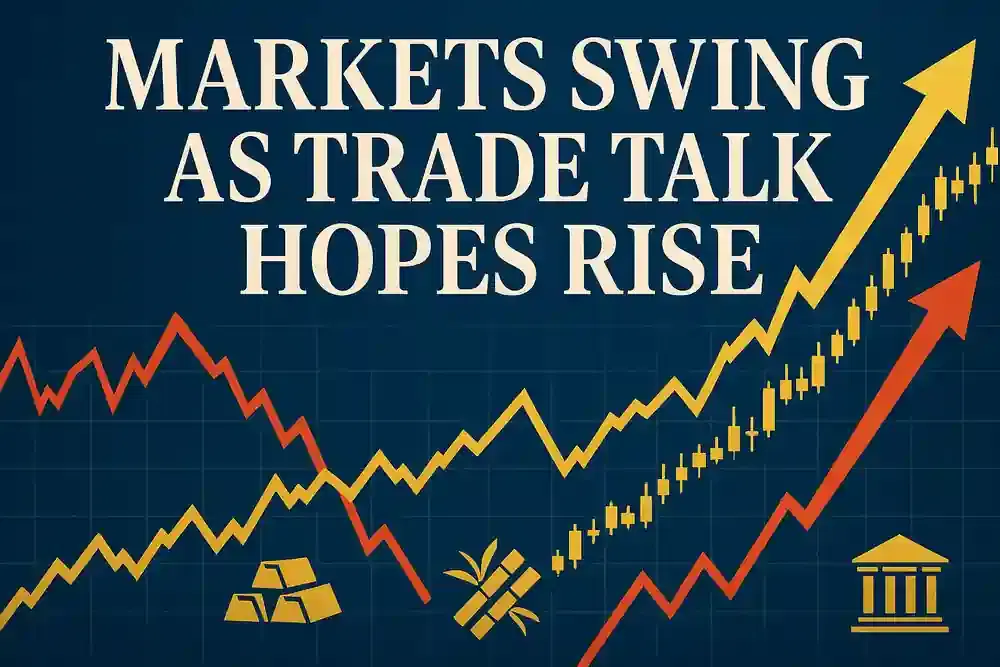Indian Markets Swing Up on US Trade Deal Hopes; Metals, Sugar Rally, AMCs Dip on SEBI Rules
Economy
|
29th October 2025, 8:22 AM

▶
Stocks Mentioned :
Short Description :
Detailed Coverage :
The Indian stock market experienced significant volatility today. The Nifty index surged past the 26,000 mark, and the Sensex approached 85,000, primarily driven by positive sentiment stemming from US President Donald Trump's indication of an imminent trade deal with India.
However, the market rally was not uniform across all sectors.
**Sectoral Performance:** * **Metals:** Metal stocks showed exceptional strength, with the Nifty Metal index reaching a record high, up over 2%. This surge was attributed to optimism surrounding easing US-China trade tensions and increasing expectations of a US Federal Reserve rate cut. Key companies like Steel Authority of India (SAIL), Hindustan Copper, Hindustan Zinc, NMDC, Vedanta, JSW Steel, Tata Steel, Jindal Stainless, NALCO, Hindalco, and Adani Enterprises all saw notable gains. * **Sugar:** Sugar stocks experienced renewed investor interest. Reports suggest the government may permit sugar exports for the 2025-26 season, as domestic supplies are abundant due to lower-than-anticipated diversion for ethanol production. This potential export approval led to gains in shares of Balrampur Chini, Dalmia Bharat Sugar, Triveni Engineering, and Shree Renuka Sugars. * **Asset Management Companies (AMCs):** In contrast, asset management companies faced sharp selling pressure. SEBI released a consultation paper proposing new rules to rationalize mutual fund expense ratios, including the potential elimination of the additional 5 basis points (bps) charge. This proposal led to significant declines in HDFC AMC, Nippon Life India Asset Management, and Prudent Corporate Advisory Services. Analysts at Jefferies noted that these changes could impact AMC profitability in the near term.
**Company-Specific News:** * **Blue Dart Express:** The logistics firm's stock jumped 15% following robust Q2 FY26 results, which showed a 29% year-on-year increase in consolidated net profit and a 7% rise in revenue. * **Adani Green Energy:** Its share price climbed 13.7% after reporting a 25% year-on-year growth in consolidated net profit for Q2 FY26. The company also saw significant expansion in operational capacity. * **Reliance Power:** The stock surged 8.3% after a period of decline, outperforming the power index, with no specific corporate announcement cited. * **Varun Beverages:** Shares rose 6.4% on the back of higher Q3 CY2025 sales volumes and improved gross margins, benefiting from international market performance and cost efficiencies. * **DCM Shriram:** The stock experienced an 8.2% climb amid an unusual surge in trading activity and volume.
**Impact:** This news carries a significant positive impact for the broader Indian stock market, driven by the optimism around potential US-India trade talks. Specific sectors like metals and sugar are poised to benefit from favorable global cues and policy developments. However, the SEBI proposal introduces a negative outlook for the asset management industry in the short term. Strong corporate earnings reported by companies like Blue Dart Express and Adani Green Energy are positive catalysts for those individual stocks and their respective sectors. Impact Rating: 8/10
**Difficult Terms:** * **Nifty:** A benchmark stock market index composed of 50 of the largest Indian companies listed on the National Stock Exchange (NSE), representing the broader market sentiment. * **Sensex:** A benchmark stock market index composed of 30 of the largest Indian companies listed on the Bombay Stock Exchange (BSE), serving as a key indicator of India's equity market performance. * **AMC (Asset Management Company):** An organization that pools money from many investors to invest in securities like stocks, bonds, and other assets. They manage these investments on behalf of their clients, often through mutual funds. * **SEBI (Securities and Exchange Board of India):** The statutory regulatory body responsible for overseeing and regulating the securities market in India to protect investor interests. * **Mutual Fund Expense Ratio:** The annual fee charged by a mutual fund to cover its operating and management expenses. It is deducted from the fund's assets and reduces the overall return to investors. * **Ethanol:** A renewable fuel additive derived from plants, commonly blended with gasoline to reduce harmful emissions and decrease reliance on fossil fuels. * **Gigawatt (GW):** A unit of power equal to one billion watts. It is frequently used to measure the generating capacity of large power plants or renewable energy installations. * **FY26 (Fiscal Year 2026):** Refers to the financial year that concludes in 2026. In India, the fiscal year typically runs from April 1 to March 31. * **Q2 (Second Quarter):** The second three-month period of a company's financial year. For example, if the financial year starts in April, Q2 would be July-September. * **Q3 (Third Quarter):** The third three-month period of a company's financial year. * **CY2025 (Calendar Year 2025):** The standard twelve-month period from January 1, 2025, to December 31, 2025. * **EBITDA:** Earnings Before Interest, Taxes, Depreciation, and Amortization; a metric used to assess a company's operating performance by excluding certain non-operating expenses and accounting decisions. * **Basis Points (bps):** A unit used to measure percentage changes in financial instruments. One basis point equals one-hundredth of a percent (0.01%). For example, a 5 basis point change is equal to a 0.05% change. * **Backward Integration:** A corporate strategy where a company acquires or controls its suppliers or other earlier stages of the production process to gain more control over its supply chain and reduce costs. * **Block Trades:** Large volume stock transactions that are typically executed outside of the regular public market, often directly between institutional investors.